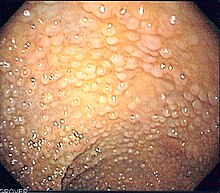| Familial adenomatous polyposis | |
|---|---|
| Other names | FAP |
 | |
| Endoscopic image of sigmoid colon of patient with familial adenomatous polyposis | |
| Specialty | Gastroenterology, Oncology |
| Complications | Colorectal cancer |
| Usual onset | <35 years of age |
| Duration | Lifelong |
| Types | Classical or attenuated |
| Causes | APC gene mutation |
| Diagnostic method | Colonoscopy Genetic testing |
| Differential diagnosis | Lynch syndrome, MUTYH-associated polyposis |
| Treatment | Colonoscopy Polypectomy Upper endoscopy Colectomy |
| Frequency | 1 in 10,000 - 15,000 |
Familial adenomatous polyposis (FAP) is an autosomal dominant inherited condition in which numerous adenomatous polyps form mainly in the epithelium of the large intestine. While these polyps start out benign, malignant transformation into colon cancer occurs when they are left untreated. Three variants are known to exist, FAP and attenuated FAP (originally called hereditary flat adenoma syndrome[1]) are caused by APC gene defects on chromosome 5 while autosomal recessive FAP (or MUTYH-associated polyposis) is caused by defects in the MUTYH gene on chromosome 1. Of the three, FAP itself is the most severe and most common; although for all three, the resulting colonic polyps and cancers are initially confined to the colon wall. Detection and removal before metastasis outside the colon can greatly reduce and in many cases eliminate the spread of cancer.
The root cause of FAP is understood to be a genetic mutation—a change in the body's tumour suppressor genes that prevent development of tumours. The change allows numerous cells of the intestinal wall to develop into potentially cancerous polyps when they would usually reach the end of their life; inevitably one or more will eventually progress and give rise to cancer (7% risk by age 21, rising to 87% by age 45 and 93% by age 50). These gene changes do not trigger cancer, but rather, they reduce the body's ability to prevent cells from becoming cancerous. Even with the gene change, it may still take time before a cell actually does develop that is cancerous as a result, and the gene may in some cases still partially operate to control tumours, therefore cancer from FAP takes many years to develop and is almost always an adult-onset disease.
The second form of FAP, known as attenuated familial adenomatous polyposis has the APC gene functional but slightly impaired. It is therefore somewhat able to operate as usual. Attenuated FAP still presents a high 70% lifetime risk of cancer (as estimated), but typically presents with far fewer polyps (typically 30) rather than the hundreds or thousands usually found in FAP,[2] and arises at an age when FAP is usually no longer considered likely—typically between 40 and 70 years old (average 55[3]) rather than the more usual 30s upward. Because it has far fewer polyps, options for management may be different.[2]
The third variant, autosomal recessive familial adenomatous polyposis or MUTYH-associated polyposis, is also milder and, as its name suggests, requires both parents to be 'carriers' to manifest the condition.
In some cases FAP can manifest higher in the colon than usual (for example, the ascending colon,[citation needed] or proximal to the splenic flexure, or in the stomach or duodenum[1]) where they show no symptoms until cancer is present and greatly advanced. APC mutations have been linked to certain other cancers such as thyroid cancer. As the mutation causing FAP is autosomal dominant, it can be inherited directly from either parent to a child. A genetic blood test of the APC gene exists that can determine whether it is present, and therefore can predict the possibility of FAP. Individuals at risk (due to family links or genetic testing) are usually offered routine monitoring of the intestinal tract every 1–3 years for life, from puberty for FAP and early adulthood for attenuated forms. Colon resection surgery is recommended if numerous colon polyps are found due to high risk of early death from colon cancer. International polyposis registries exist that track known cases of FAP or APC gene defects, for research and clinical purposes. Mutation of APC also occurs commonly in incident cases of colorectal carcinoma, emphasizing its importance in this form of cancer.
- ^ a b Soravia, C.; Berk, T.; Madlensky, L.; Mitri, A.; Cheng, H.; Gallinger, S.; Cohen, Z.; Bapat, B. (June 1998). "Genotype-phenotype correlations in attenuated adenomatous polyposis coli". Am. J. Hum. Genet. 62 (6): 1290–1301. doi:10.1086/301883. PMC 1377162. PMID 9585611.
- ^ a b GeneReviews NBK1345
- ^ "Familial adenomatous polyposis: MedlinePlus Genetics". MedlinePlus. Retrieved 2023-06-09.